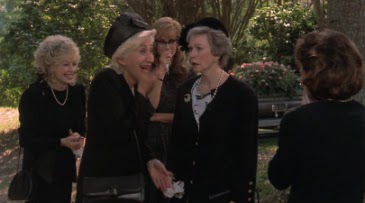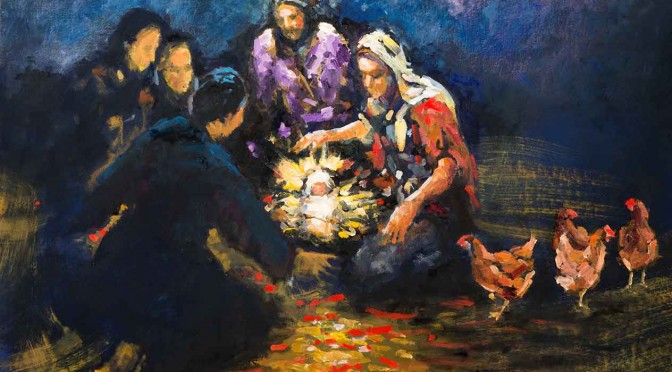**sermon art: The Baptism of Christ by Daniel Bonnell
Caitlin Trussell with Augustana Lutheran Church on January 11, 2026 – Baptism of Our Lord Sunday
[sermon begins after the Bible reading]
Matthew 3:13-17 Jesus came from Galilee to John at the Jordan, to be baptized by him. 14 John would have prevented him, saying, “I need to be baptized by you, and do you come to me?” 15 But Jesus answered him, “Let it be so now, for it is proper for us in this way to fulfill all righteousness.” Then he consented. 16 And when Jesus had been baptized, just as he came up from the water, suddenly the heavens were opened to him and he saw God’s Spirit descending like a dove and alighting on him. 17 And a voice from the heavens said, “This is my Son, the Beloved, with whom I am well pleased.”
[sermon begins]
Over the past few weeks of the Christmas season, we’ve been rightly focused on the sweet baby Jesus—celebrating both his birth to Jewish parents, and the Epiphany of his arrival as a gift to all the nations, to the non-Jews. To us. Today we turn from the sweet baby to the grown-up bearded Jesus. Things happen fast in Matthew’s gospel. Last week we heard about the wise men who followed a star to bring gifts to the baby Jesus. Today we gather on the festival of the Baptism of Our Lord – the day when Jesus plunges into the waters of baptism. In this plunge, all righteousness is fulfilled, all that is pure, sacred and holy is fulfilled. Jesus’ plunge into the waters of John’s baptism is a saturating and surprising immersion into the flow of God’s righteousness. And, as Jesus came up from the waters, the Spirit landed on him like a dove as God proclaims, “This is my Son, the Beloved…” Jesus’ baptism is an astounding act followed by an awesome announcement. It may surprise you to learn that his baptism was not a Christian one.
Ritual washing was and continues to be common among our Jewish cousins in the faith. John was not baptizing people in the name of the Father, and the Son, and the Holy Spirit. His was a baptism of repentance.[1] The Bible doesn’t give us a lot about Jesus and John the Baptist’s relationship aside from their mothers knowing each other.[2] John was a mysterious figure out in the wilderness calling people to repent. People flocked to him from Jerusalem and all Judea to be baptized with water for repentance.
Repentance is commonly understood as a moral move. Like, I was doing something bad and now I’m going to start do something good instead. But the word repentance here in Matthew means something more like a changed mind or a new understanding.[3] For Jesus, this baptism didn’t wash away sin as much as it revealed what God had in store for him next.[4] A thrilling scene of the spirit descending on Jesus, imparting the power to speak for God, and the authority to drive out unclean spirits.[5] A thrilling scene into which God speaks for others to hear, “This is my Son, the Beloved…”
While Jesus didn’t receive a Christian baptism, many of us were baptized with water in the name of the Father, and the Son, and the Holy Spirit. Baptized into Jesus’ death and resurrection to follow where he leads, to see what God has in store for us next. What’s in store for us next is sometimes clear. Like with Welcome 150’s mission that is to connect us more closely with God, each other, and the wider community. More than a building renovation, Welcome 150 points us to God’s future for us in concrete and transcendent ways. The Epiphany matching gift opportunity is energizing and hopeful. As Pastor Michael preached last Sunday, “Christmas delivers light…Epiphany hands it over to us and gives us what we need to move forward.” His sermon was a powerful reminder that we are entrusted with the light, to carry it, to share it, and to move forward with it.
Our almost 150-year-old congregation has worshiped in three different buildings. Caring for an historic building like this Mid-Century Modern queen is a new learning curve. Together we decided to learn what God has in store for us by shining the light through this place and expanding our accessibility, welcome, energy efficiency, and more. Welcome 150 is a means to a mission centered on the good news of Jesus.
Figuring out what God has in store for us next is also where things can get spicey. Our unity in baptism is not the uniformity of a hive mind. Attending a church meeting of any kind reveals diversity that allows for rich conversation. As a case in point, Pastor Michael is leading a six-week series on Faith and Civic Life. Upwards of 45 people came here last Tuesday at 10 a.m. and 7 p.m. to tease apart what it means to follow Jesus and to live in this country. The classes explore the deep connections between Christian faith, discipleship, and civic life. Rooted in the ELCA’s Study of Civic Life & Faith, this series creates space for learning, reflection, and thoughtful conversation, even when we do not all agree.
Reverend Doctor Martin Luther King Jr. argued that a positive peace is the presence of justice, and a negative peace is the absence of tension. We don’t tend to enjoy this formative tension. Tension pulls us out of our comfort zones and asks hard questions. Questions that need to be asked in our country across decades and even centuries. We began as a divided country from our very inception. The hope of religious freedom for European immigrants was eclipsed by the obliteration and relocation of the native peoples who long lived on this land and continue to do so. The dream of prosperity was manifested in the south AND the north first on the shoulders of enslaved black Africans and then on the shoulders of various immigrant communities who’ve arrived seeking their own dreams. The historical record right on up through today is loaded with conflict about who belongs in this country and who doesn’t. We’ve moved beyond spicey into matters of life and death.
About as timely as it gets, this Tuesday’s class led by Pastor Michael asks the question, “How Do Christians Address Controversial Civic Issues?” All are welcome. Bring your curiosity, your convictions, your questions, and your hope. This is an invitation to grow in faith, deepen understanding, and practice thoughtful, faithful engagement in the public square. Practice gives us a chance of remaining connected across the divide by the power of God’s love.
We complicate Jesus’ command to love in as many ways as humanly possible. But the Beloved Son leads us by example into what God has in store for us next. He blessed strangers and non-Jews, he ate meals with unlovable people, he had public conversations with women no one spoke to, and he had secret conversations with religious leaders who opposed him by day. When Jesus was arrested just before his crucifixion, one of his friends tried to fight off the guards arresting him and Jesus told him to put the sword away. Jesus raised his hand in healing at the time of his arrest, not violence. Through the waters of baptism God promises to draw us into deeper relationship with God and into lives that are ever more Christ-shaped. In our community and across the country, it’s obvious that we need some saving. We need saving from ourselves and from the harm we inflict on one another even when we’re trying to do good.
Our ELCA Lutheran Presiding Bishop Yehiel Curry says it this way:
“We are a church dedicated to the work of justice and peace, hope and renewal, love and grace. We hope for greater justice in this world and peace for all humanity. We hope for renewal in God’s salvation.”[6]
Bishop Curry reminds us that renewal is possible because what God has in store for us is already fulfilled in the righteousness of God’s Son, the Beloved. A son given to us as a child born for us…authority rests on him and he is named the Prince of Peace.[7] A Savior who is “good news of great joy for all people.”[8] Thanks be to God for this indescribable gift,[9] in whom we are baptized and set free. Amen.
____________________________________________________________
[1] Matthew 3:11
[2] Luke 1:39-56
[3] Matthew L. Skinner. A Companion to the New Testament: The Gospels and Acts. (Waco: Baylor University Press, 2017) 118-119.
[4] Matthew L. Skinner, Professor of New Testament, St. Paul, MN. Podcast commentary on lectionary readings for January 11, 2026. #1063: Baptism of Our Lord – January 11, 2026 – Working Preacher from Luther Seminary
[5] Ibid.
[6] Presiding Bishop Yehiel Curry. Waiting With Hope. Living Lutheran, Winter 2025, page 50.
[7] Isaiah 9:6-7
[8] Luke 2:10-11 The angels announce Jesus’ birth to the shepherds in the field.
[9] 2 Corinthians 9:15

![The Hope That God Has in Store for Us [OR Jesus Wasn’t Baptized a Christian]](https://caitlintrussell.org/wp-content/uploads/2026/01/Daniel-Bonnell.The-Baptism-of-Christ.sermon-Caitlin-Trussell-672x372.jpg)


![What is Truth? [OR Christian Nationalism is Neither Faithful nor Patriotic]](https://caitlintrussell.org/wp-content/uploads/2024/11/creche-cross-and-crown.sermon-caitlin-trussell.jpg)
![Glorious Grace [OR Christians in a Country that Separates Church from State] Mark 6, Ephesians 1, and Amos 7](https://caitlintrussell.org/wp-content/uploads/2024/07/church-and-state-street-sign-672x372.jpg)
![The Wonder of It All [OR Hope Dazzles on a Mountaintop] Mark 9:2-9](https://caitlintrussell.org/wp-content/uploads/2024/02/Transfiguration.Armando-Alemdar.Ara_.2004.GNU-Free-Documentation-License-672x372.jpg)

![Trick or Treating – Loving the Littles [OR No tricks, no treats, just hope]](https://caitlintrussell.org/wp-content/uploads/2023/10/Halloween-drawing-trunk-or-treat-500x372.jpg)
![Hope Shines in the Darkness [OR Christ’s Compassion Knows No Bounds]](https://caitlintrussell.org/wp-content/uploads/2023/10/sun-rising-over-earth-light-in-the-darkness-672x372.jpg)